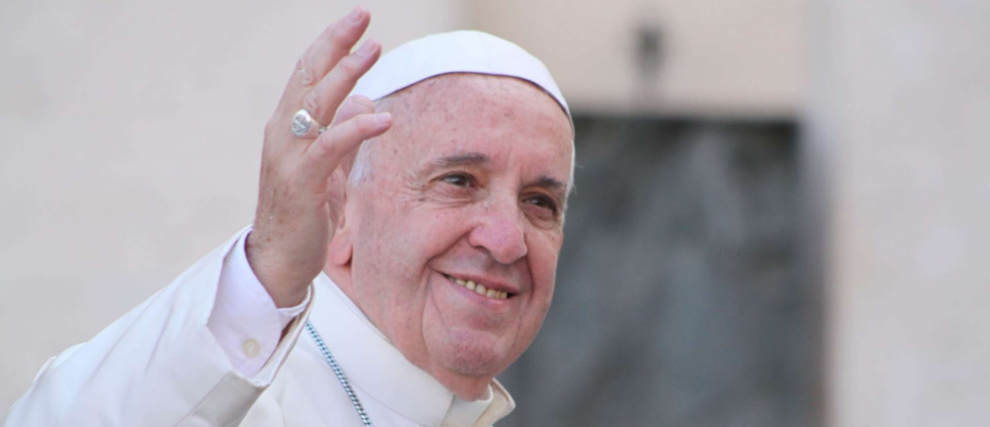Saint Pius X
“To renew all things in Christ”, is a famous quote from Saint Pius X, who thusly announced and summarized his pontificate.
Giuseppe Sarto was born in Riese, Veneto, in 1835. Born to a very modest family, he considered the priesthood very early, despite the limited means of his parents. He reached seminary as best he could and gradually rose through the ranks of the ecclesial hierarchy until he became pope, in tears, in 1903. He died the day after the beginning of World War I, in 1914 at the age of 79. Some contemporaries do not hesitate to compare him to Pope Francis in his pastoral style. Both conceive of their office as an episcopal ministry, are animated by great missionary fervor, and do not hesitate to joke. His humility, his eagerness to work, and his desire to be close to the poor are also found in Pope Francis.
(Discover other saints and blessed people of the Church in the Guide to Saints)
Biography of Saint Pius X
Born into a very modest Venetian family of ten children, Giuseppe Sarto showed a desire for the priesthood from an early age. However, his father, a postman, and his mother, a seamstress, did not truly consider their son's ecclesiastical career, because they lacked the income to allow him to attend seminary. It was his parish priest who found the necessary funds to allow him to enter the seminary of Padua in 1854, aged 19. After four years, he was ordained a priest after an excellent career, and developed an expertise in Gregorian chant. Appointed vicar of Tombolo, he created a small school of Gregorian chant for parishioners.
Appointed archpriest of Salzano in 1867 and canon of the cathedral of Treviso in 1875, he also became spiritual director of the seminary of the diocese.
The Papal States were wiped off the map in 1870, and Pius IX died in his Vatican Palace in 1878. It was Leo XIII who succeeded him, wishing for openness and reconciliation with temporal power.
A fervent defender of Gregorian chant, Giuseppe supported the Benedictines of the Abbey of Saint Peter of Solesmes in favor of the restoration of Gregorian chant, opposing Pope Leo XIII who supported Neo-Medicine chant. He was consecrated Bishop of Mantua in 1884, then Patriarch of Venice in 1893 against his will, and simultaneously as Cardinal.
Leo XIII died in 1903, and his most likely successor, Cardinal Rampolla, was losing votes to Cardinal Sarto. Then, Rampolla was the victim of an exclusion (veto privilege was granted to some countries for the pontifical election) launched by Austria-Hungary against him, which definitively removed him from the race for the papacy. In tears, Cardinal Sarto refused the supreme coronation of the Catholic Church, before being convinced. He was therefore elected pope on August 4, 1903. He then chose the name of Pius X, in honor of the popes of the nineteenth century who had “courageously fought against sects and swarming error.” One of his first actions was to abolish the exclusion, a practice that had prevented Rampolla from being elected. Without diplomatic experience or academic training, he quickly distinguished himself by his pastoral style, simple and direct, which divided Rome. He knew how to surround himself with people with the skills he lacked. In his encyclical E Supremi dated October 1903, he indicated that he wanted to “bring the human race back to the empire of Christ,” and insisted on the place of the Eucharist as a pillar of Christian life: “It is the divine sacrament that assures us of eternal life and makes us certain that we will fight victoriously against our enemies.” It was he who instituted the first communion at the age of 7, before confirmation, reversing the order used until then.
He quickly devoted himself to the reorganization of the Roman Curia and to the drafting of the Code of Canon Law. He encouraged liturgical reform and the practice of sacred singing. Committed to maintaining an incompressible time of prayer and a certain simplicity in one’s environment, he arranged a sober and reduced apartment within the Vatican.
Anxious to disseminate the rudiments of the Catholic faith to young people, and aware of the importance of this dissemination to emerging immigrant populations, he undertook the drafting of a catechism, whose simple language, clarity and precision were praised by Pope Benedict XVI in an audience in 2010.
Breaking with his predecessor, he showed a fierce opposition to the modernist theses of the time, which aimed to draw inspiration from modern philosophical, psychological and historical theses to integrate them into the Church. He strongly condemned in an encyclical the errors of modernism and considered it as the “synthesis of all heresies.”
In his reorganization of the Roman Curia, he helped to save money by bringing together the prerogatives of several dicasteries.
In addition, he opposed the new French law of separation of Church and State in 1905, which earned him a quarrel with the French State. In an encyclical of 1912, he protested against the inhuman treatment of the American Indians, and called on the local clergy to rise up and act against the massacres, slavery, and ill-treatment of which they are victims, including by Catholics, which Benedict XIV had already done in 1741.
Very tormented by the winds of war in 1914, he could not prevent the beginning of hostilities on July 29, 1914 and in his exhortation Dum Europa, he called for peace. A few days after the publication of the exhortation, he fell ill with bronchitis and died on August 20, 1914. The Catholic faithful were very affected, and the devotion to the former pope led to an opening of his cause for beatification in 1923. In 1943, the heroism of his virtues was proclaimed by Pius XII, and he was soon after declared a servant of God. Two miracles in 1928 and 1938 allowed his cause to succeed in 1951. Then, two new miracles led to his canonization in 1954. This would be the first pope canonized since the sixteenth century.
Quotations from Saint Pius X
“One does not applaud the servant in the house of the master.”
“The baptism of Clovis marks the birth of a great nation: the tribe of Judah of the new era.”
Three inspiring prayers from Saint Pius X
Prayer to the Immaculate Conception
Most Holy Virgin, who has pleased the Lord and has become his Mother, Immaculate Virgin in your body, in your soul, in your faith, and in your love, look with kindness on the unfortunate who implore your powerful protection. The infernal serpent, against whom was thrown the first evil, continues, helplessly! To fight and tempt the poor sons of Eve. O You, our blessed Mother, our Queen and our Advocate, you who have crushed the head of the enemy from the first moment of your Conception, welcome our prayers, and, we beseech you, united in one heart, present them before the Trojan of God, so that we may never be caught in the snares that are held out to us, but that we may all arrive at the port of salvation, and that in the midst of so many perils, the Church and the Christian society may once again sing the hymn of deliverance, victory and peace. So be it.
Prayer to Saint Joseph, model for workers
Glorious Saint Joseph, model of all those who are devoted to work, obtain for me the grace—to work in the spirit of penance for the atonement of my many sins; - to work in conscience, putting the worship of duty above my inclinations; - to work with gratitude and joy, considering it an honor to use and develop by work the gifts received from God; - to work with order, peace, moderation and patience, never retreating from weariness and difficulties; - to work above all with purity of intention and with detachment from myself having constantly before my eyes death and the account that I will have to give back lost time, unused talents, good omitted and vain complacency in success, so fatal to the work of God. All for Jesus, all for Mary, all in your imitation, Patriarch Saint Joseph! This will be my motto for life to death. So be it.
Prayer to Sweetest Jesus
“O sweetest Jesus, you came into this world to give to all souls the life of your grace; you wanted, to preserve and strengthen this life in them, to be the remedy for their daily weaknesses and to become their daily food. We therefore humbly ask you, through your Heart burning with love for us, to pour out your divine Spirit on all, so that those who have the misfortune of being in a state of mortal sin may be converted to you and recover the life of the grace they have lost; and that those who, by your grace, already participate in this divine life, may devoutly approach your holy table every day, if they can, so that, through daily communion, they may receive every day the antidote that will preserve them from the venial faults of each day, that they may strengthen every day in them the life of your grace, and that finally, thus purifying ever more their souls, they may come to possess with you the blessed life. So be it.”
Pray on Hozana with the popes
Let us pray for the Pope's intentions with
.On Hozana, you can find many communities to pray and walk with the saints. Some allow you to pray with and for the popes, such as
to unite our Lenten prayers around the Pope's intentions, or to defend dignity.
